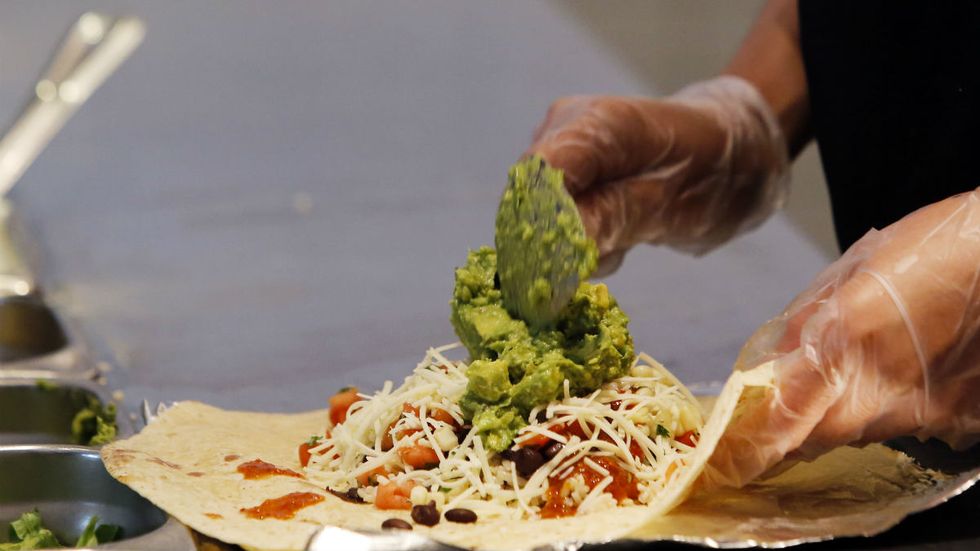
© 2024 Blaze Media LLC. All rights reserved.
Burritos might cost a little more if the Mexican government doesn’t pull its weight on illegal immigration.
A new statement from Chipotle CFO Jack Hartung says that the burrito chain might have to raise prices by about one nickel per burrito if the Trump administration’s proposed tariffs to pressure the Mexican government go into effect.
“We know that we could easily solve the volatility in our supply chain by purchasing pre-mashed or processed avocados which would be cheaper, readily available and provide stability, but we are committed to our brand purpose and upholding our food with integrity principles,” Hartung told Fox Business.
While that news might elicit grumbles from the Chipotle fans undeterred by the company’s previous food poisoning woes (as well as wails from anyone looking for an excuse to bash Trump on immigration) here are 7 things far worse than paying a slightly higher premium on a trendy lunch, only a few of the bad things currently happening as a result of the massive border and humanitarian crisis that these provisional tariffs are meant to combat.
Ebola:
Customs and Border Protection (CBP) announced last week that “the first large group of people from Africa" was apprehended, including people from areas experiencing large Ebola outbreaks. CBP noted that the group was screened medically, but the problem with Ebola is that the initial symptoms are often unremarkable and take a while to diagnose.
Human trafficking:
The cartels are currently making a fortune smuggling people across our border. Some smugglers are even reportedly running radio ads in Central America. “Human trafficking will reach new heights in the United States in the next 18 to 24 months,” warns Jaeson Jones, retired captain with the Texas Department of Public Safety’s Intelligence and Counterterrorism Division. “Several cartels have stated that they cannot keep up with the number of people surging through their plazas throughout Mexico.
Disabled people being left to drown:
Last week, Border Patrol Sector Search, Trauma, and Rescue (BORSTAR) watched a dozen illegal immigrants crossing into the United States when smugglers dumped a double amputee into the Rio Grande River; they later threw a paraplegic man into the water as well. U.S. officials rescued both.
Sexual assault:
Roughly one-third of women who make the journey to cross the United States border are sexually assaulted, Doctors Without Borders says. Older numbers from Amnesty International put the number even higher. Yet the lax security and broad loopholes keep driving people north.
The drug crisis:
How much explanation does this really need? We’re in the middle of a massive drug crisis, and those who try to ignore the border crisis’ role in it at this point are in an advanced state of denial.
Children being kidnapped and “recycled” by human traffickers:
Immigration officials are now documenting and referring for prosecution traffickers who “recycle” migrant children who get sent back to Central America so that they can later be claimed as part of a fake family unit. DHS numbers from last year showed an “eye-popping increase” in the number of kids being kidnapped at the border for similar reasons.
MS-13:
The bloodthirsty MS-13 street gang was almost eradicated during Bush’s second term. Now, in addition to the money to be made from the drug and human trades, the border crisis has provided the crime syndicate with new a new influx of recruitment opportunities.
Yes, the costs of tariffs ultimately fall on American consumers and constrain overall buying power, which is why the supposed merits of protectionism as a long-term international economic paradigm are dubious at best.
We can even have a legitimate discussion about whether putting pressure on the Mexican government is the most prudent path at this juncture, given the remaining unused tools that the president still has in his immigration toolbox, combined with the fact that Mexico City has about as much control over Mexican territory as Kabul has over Afghanistan.
Whether these targeted, issue-specific measures will prove effective at getting further cooperation from the Mexican government on the immigration issue remains to be seen. The upcoming meeting between the administration and delegates from Mexico City ought to be a good indicator.
But in the meantime, let’s not lose sight of the gravity of the actual problem here.
#mc_embed_signup{background:#fff; clear:left; font:14px;}
/* Add your own MailChimp form style overrides in your site stylesheet or in this style block.
We recommend moving this block and the preceding CSS link to the HEAD of your HTML file. */
Want to leave a tip?
We answer to you. Help keep our content free of advertisers and big tech censorship by leaving a tip today.
Want to join the conversation?
Already a subscriber?
Nate Madden
Nate is a former Congressional Correspondent at Blaze Media. Follow him on Twitter @NateOnTheHill.
more stories
Sign up for the Blaze newsletter
By signing up, you agree to our Privacy Policy and Terms of Use, and agree to receive content that may sometimes include advertisements. You may opt out at any time.
© 2024 Blaze Media LLC. All rights reserved.
Get the stories that matter most delivered directly to your inbox.
By signing up, you agree to our Privacy Policy and Terms of Use, and agree to receive content that may sometimes include advertisements. You may opt out at any time.
